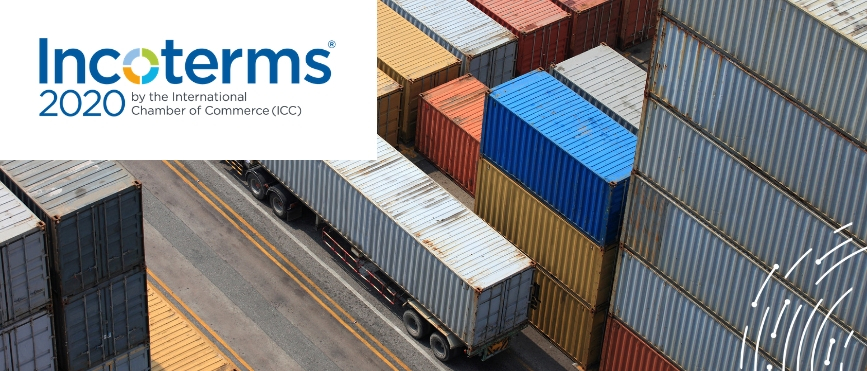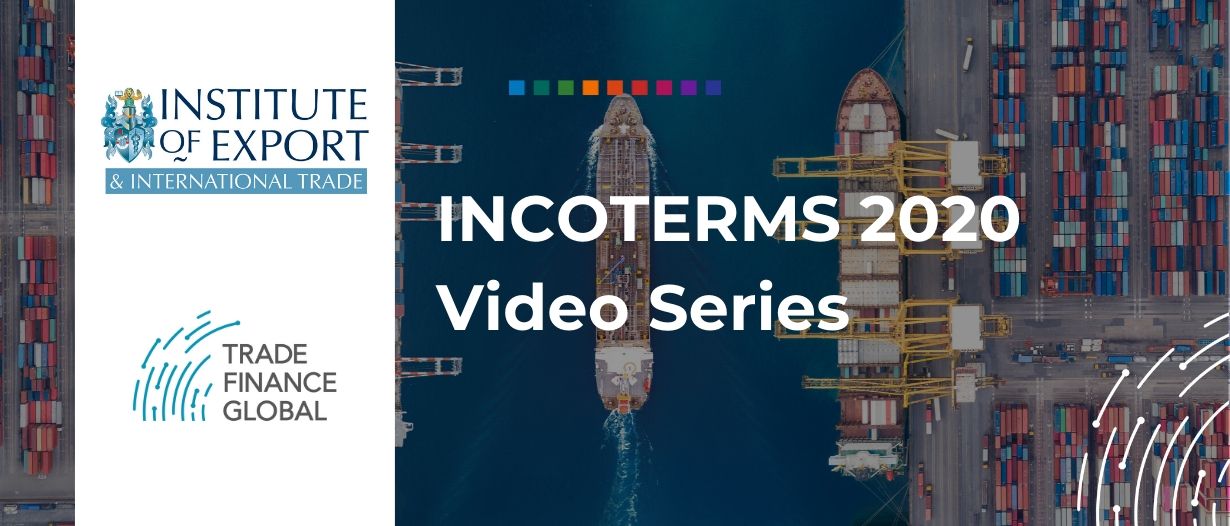Trade Finance Global spoke to Chris Southworth, Secretary General of the ICC United Kingdom, and Lesley Batchelor OBE, Director General at the Institute of Export and International Trade about Incoterms® 2020 and what this means for businesses in the United Kingdom
Featuring:
Moderator: Deepesh Patel, Editor, Trade Finance Global
Lesley Batchelor OBE, Director General, Institute of Export (LB)
Chris Southworth, Secretary General, ICC United Kingdom (CS)
These videos were taken as part of a Media Partnership between TFG and IOE&IT at the World Trade Summit 2019.
Introduction to Incoterms
- What are Incoterms® and why are they important?
- Why are Incoterms® necessary, and why can’t we just use a contract?
- What is the safest way to incorporate Incoterms® 2020 rules into a contract?
What are Incoterms® and why are they important?
LB: Incoterms, interestingly enough started in 1936, which is one year after the Institute of Export was formed. So I always remember that, and Incoterms are a really important part of the contract, they’re not a contract. But what they do is they give businesses around the world guidelines and an understanding of what they’ve committed to in terms of risk obligations and costs. So – who’s paying for what, where does the risk pass in the goods and what obligations do you have as a buyer and as a seller?
Why are Incoterms® necessary, and why can’t we just use a contract?
CS: Well, that’s a good question that, I mean, you can see that in other parts of the global economy. But you know, if you imagine 200 countries with 200 different legal systems, which is effectively what we’ve got, that is an absolute nightmare for a business, you know, shipping goods or trading across boundaries and borders. So the more commonality you can have one set of rules, everyone following the same sort of common framework, then obviously, that makes life an awful lot easier. We understand what we mean by costs and risks and where and who’s carrying those responsibilities it’s absolutely critical it’s the underpinning of the whole of global trade. It’s absolutely essential.
What is the safest way to incorporate Incoterms® 2020 rules into a contract?
LB: I think the best way of working with Incoterms is to make sure that they form part of your contract, that you make reference to them. And when you’re quoting, you’re very clear on what you’re quoting to. So it’s, you know, delivered duty unpaid and then unnamed destination as per Incoterms 2020, because actually, the Incoterms are simply a way of working. And actually, if you said as per Incoterms 2000, it would be just as relevant as long as we all knew what we were working with. It’s a question of actually laying out what terms under which you’re going to operate as far as the contracts are concerned. So that actually, when you move forward, you know exactly where the costs and the obligations and the risk passes.
Incoterms® 2020 – Origins and History
- What are Incoterms® and why have the ICC created them?
- Why have Incoterms® 2020 been updated?
- What are your key tips for buyers and sellers using Incotems® rules?
What are Incoterms® and why have the ICC created them?
CS: Well, Incoterms have got an interesting history – is that it was the first rule book created by ICC. So it really goes back to the origins of ICC actually, we were created after the World War One, the aftermath of World War One when there was actually no global trading framework at that time, you know, companies were either trading on their own through Royal Charters, or whatever. But in the back end of the war, there was a sort of a grouping of business leaders, one of which came from the UK, the chairman, of Natwest Bank to really kind of set down a framework create the International Chamber of Commerce and the first rule book that came out of the ICC was was Incoterms And that was really in an effort to create a stronger rules based trading system where everybody was on a level playing field where they could share and use the same terminology across different jurisdictions, legal jurisdictions. And so incoterms was, is a key part of our history. We’re 100 years old, that Incoterms isn’t far behind. But ultimately, it’s about the they set the rules for all buyers and sellers of goods. So anyone importing, exporting in whatever country in the world, they are the sort of global benchmark of the terminology used to differentiate who carries risk and cost at any one point of the transaction and movement of those goods. So really, really important. Obviously, we’re shipping through rail or or shipping cargo aeroplanes doesn’t matter. You know, incoterms are widely used around the world.
Why have Incoterms® 2020 been updated?
LB: Incoterms are updated every 10 years, and it’s quite a sensible thing – actually, we all know things become less and less current. And I think at the moment, the Incoterms we’re working with doesn’t reflect the way we do business necessarily. And I think we’re trying to move businesses into accepting that there are maritime incoterms and multimodal incoterms, which I think is one of the key points of the new 2020 incoterms.
What are your key tips for buyers and sellers using Incotems® rules?
CS: So I think that the critical message is one check you using the right terms under the 2020 framework that comes into force on the 1st of January 2020. We’ve also learned that the standards in which the sort of training standards in which companies are accessing is not up to grade including in the UK, while they were a leader in the use of Incoterms, we’re not using it consistently. So we’ve really put in place now national training framework where everybody’s within the ICC is now ICC, accredited at a certain level, just like you would pass an exam, a university, all our trainers now have to pass a test and exam. And that’s really to sort of weed out those who are not training properly and not experienced. But I think the other takeaway from all of this is, you need to be experienced. It’s a bit like a driving test, you can read the book, and you can apply the theory, but that’s not actually what you need. If you’re getting advice as a company, you need to have someone who’s actually been on the road for a while, been in the trade environment for a while to understand the scenarios and the likelihood of what those risks are, and then you’ll get much better advice about which incoterm you should be using.
Incoterms® 2020 – Key Changes
- What are the key changes for Incoterms® 2020?
- How should buyers and sellers incorporate Incoterms® into agreements and contracts?
What are the key changes for Incoterms® 2020?
LS: There are a great deal of changes in Incoterms 2020 – one of the biggest changes is how we’re actually laying them out and how we’re explaining to people how to use them. And there’s lots more clarity on that. And that’s making a huge difference. So the way the booklets are laid out, you can actually look under one set of terms to find out whose responsibilities they are. But also, there’s another set that would tell you more about the documentation and how that what that really means. So there’s something broken down into the modes, but there’s also something broken down into what we call the first A10, which is the seller’s responsibilities and that starts off with the basic obligations and goes all the way through to the costs and who pays what. And I think that’s a really useful way of doing it. The layman doesn’t, doesn’t always understand what those implications are. And they don’t always understand where to use incoterms. I think that’s a really important part goes back to this thing. I often suggest to people that if they’re going to use incoterms, as part of their contracts, that actually on their website under the terms and conditions, there should be another page referring to incoterms so that people have it absolutely clear under what terms they’re being quoted, because if you can get it straight right at the very beginning, that’s when you avoid disputes later on. The major thing that’s really changed within incoterms is that we’ve now changed DAT, which is Delivered the Terminal to DPU, which is Delivered at Place, Unloaded. And once you’ve got the unloaded issue there you are actually in a different world altogether. And it’s all about the destination that you’re talking about. So it might be delivered only to one point but unloaded somewhere else. So it’s about making sure that there’s clarity there in everything that we’re trying to achieve.
How should buyers and sellers incorporate Incoterms® into agreements and contracts?
CS: Yeah, I mean, typically they go into a legal contract. And I think it can be problematic. Companies increasingly don’t use contracts. And that’s a problem. So we are trying to help companies use the right incoterms in whatever terms and conditions or heads of terms or sort of light touch contracts. The ICC has a model contract, which is a sort of a template for anyone in the world to use, particularly for small companies. But in the UK, that that’s it’s not uncommon for companies just to be trading on invoices and, you know, paperwork that’s not legally binding, actually, it’s quite surprising. So we’ve, we’ve sort of partnered up with a company called Open Borders Direct this year and launched a world first, that’s an online platform that allows companies to walk them through the process and almost select the right incoterm for them, and allow them to select whatever the sort of contract form they want either their owns their own contract form, or terms and conditions, heads of terms of whatever that might be, to try and make it a bit easier for companies to understand what to do. And also take the thinking away, you don’t want to read a book if you’re a CEO or sales manager in an SME, you just want to know what’s the incoterm I should be using. And you don’t necessarily want to spend a lot of money on a lawyer. You know, we should we need to make that a lot easier. So that’s what we’re trying to do.
Incoterms® Top Tips
- Why is understanding Incoterms® and training so important for freight forwarders, banks and traders?
- What 3 pieces of advice would you give to buyers and sellers when it comes to Incoterms®?
Why is understanding Incoterms® and training so important for freight forwarders, banks and traders?
LB: Well, I have to say that I was very pleased to see how the new incoterms impact and how they’re beginning to really get people to think and I suppose with the current circumstances with Brexit, etc, people have been much more trade aware much more keen to understand what’s going on. And obviously, I think that makes a huge difference. So, incoterms 2020 we’re trying to make sure that we have accredited trainers out there that who understand how to do the terms, how to use them properly and to stop any confusion that there can be. I honestly believe that if you can start off and encourage British businesses types and have a contract and an understanding of the International terms and conditions that they should have, and an understanding of how the incoterms impact on those conditions. We’re actually going to start international traders and help businesses, not get into misunderstandings not to get into trouble doing things, and actually really trade successfully, especially as we’re moving into this new world of everybody trading with the rest of the world instead of just that. And I think obviously, people that are trading with the EU will also have to take careful note of this too because they will be operating or should be operating under international terms and conditions.
What 3 pieces of advice would you give to buyers and sellers when it comes to Incoterms®?
CS: I mean, I think, you know, go to the source, you know, Incoterms comes from ICC. So if you’re seeing Incoterms out there that it’s not ICC got the ICC brand on it to be worried, ask the question, is it right? Am I being trained by the right people? Am I getting the proper advice from where the source is, which is the International Chamber of Commerce. Secondly, you know, get training – there is no harm whatsoever in getting a refresher or getting teams up to speed. But it definitely requires training to use incoterms correctly and use them correctly. And be aware that when you’re trading into some markets, some governments enforce the incoterm – legally, you have to use specific incoterms you will be very it’s not just about what the incoterms are per se. It’s also understanding who or what country you’re trading Incoterms and what they require you to use.
Incoterms® and Brexit
- Why is the importance of the new Incoterms® rules in light of Brexit?
- What 3 pieces of advice would you give to buyers and sellers when it comes to Incoterms®?
Why is the importance of the new Incoterms® rules in light of Brexit?
CS: Well, yeah, I get asked a lot about, you know, what are the implications in relation to Brexit in theory, Incoterms is not affected by Brexit. It sits above Brexit. It’s about trade across the board. But I think where Brexit is kind of useful, is it forces you to look at what are the arrangements are going across the border, particularly those borders change? We don’t know yet still, whether those borders will change and what the arrangements will be. But it doesn’t make you sit back and say, okay, where are we shipping the goods through? What means is that ships, rail, whatever, and then occurs that then the next question is, am I using the right Incoterm to manage my risks and costs? And so from that point of view, I think it’s really important if there’s a major change in trading relationships, you know, on borders, then then maybe more, more significant, but at the moment, I think it’s more sort of trigger a reason to be reviewing what, what’s the sort of legality in your trading arrangements and that’s so that’s a positive. There’s not a lot of negativity, should we all be doing that more regularly anyway?
What 3 pieces of advice would you give to buyers and sellers when it comes to Incoterms®?
LB: Well, I think I would suggest they learn it three and four hours of that of your time. Start incorporating them in your quoting system, start integrating them in all of your communications, have them on your website, make sure you understand what it is your obligations are, where the risk passes because life is just going to be so much simpler if you do. Other terms, other ideas, just basically, find out as much as you possibly can about how your customer wants to operate because it’s about your customer and servicing them. And most important, I think we need to make sure that it’s possible to do the term that you’ve agreed to do. So delivered duty paid – sometimes it’s a very difficult term to actually complete and has finished. So make sure you research part of your research should be which incoterm would really work for the best for that customer.
Incoterms® Index
Ex Works EXW Free Carrier FCA Carriage Paid To CPT Carriage and Insurance Paid To CIP Delivery at Place DAP Delivered At Place Unloaded DPU Delivery Duty Paid DDP Free Alongside Ship FAS Free on Board FOB Cost and Freight CFR Cost Insurance and Freight CIFDon’t miss the ICC United Kingdom Incoterms 2020 Breakfast Seminar

Join the ICC United Kingdom and London Institute of Banking and Finance to discuss the changes to the ICC Incoterms® 2020 rules; the globally recognised trade terms for the sale of goods, providing certainty and clarity to business and traders everywhere.
Venue: LIBF – London Institute of Banking and Finance Peninsular House, 36 Monument Street, London EC3R 8LJ
Date and Time: 15th November, 08:30 – 10:45




























